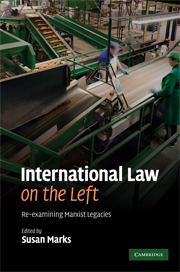Book contents
- Frontmatter
- Contents
- Contributors
- Acknowledgements
- Introduction
- 1 What should international lawyers learn from Karl Marx?
- 2 An outline of a Marxist course on public international law
- 3 The commodity-form theory of international law
- 4 Positivism versus self-determination: the contradictions of Soviet international law
- 5 Marxism and international law: perspectives for the American (twenty-first) century?
- 6 Toward a radical political economy critique of transnational economic law
- 7 Marxian insights for the human rights project
- 8 Marxian embraces (and de-couplings) in Upendra Baxi's human rights scholarship: a case study
- 9 Exploitation as an international legal concept
- Index
4 - Positivism versus self-determination: the contradictions of Soviet international law
Published online by Cambridge University Press: 07 September 2009
- Frontmatter
- Contents
- Contributors
- Acknowledgements
- Introduction
- 1 What should international lawyers learn from Karl Marx?
- 2 An outline of a Marxist course on public international law
- 3 The commodity-form theory of international law
- 4 Positivism versus self-determination: the contradictions of Soviet international law
- 5 Marxism and international law: perspectives for the American (twenty-first) century?
- 6 Toward a radical political economy critique of transnational economic law
- 7 Marxian insights for the human rights project
- 8 Marxian embraces (and de-couplings) in Upendra Baxi's human rights scholarship: a case study
- 9 Exploitation as an international legal concept
- Index
Summary
Introduction
The Soviet theory and practice of international law, if it is the subject of any consideration today at all, is usually dismissed as a purely historical example of an extreme species of positivism, and of no contemporary interest. Most often it is ignored. For example, in his essay ‘What should international lawyers learn from Karl Marx?’, Martti Koskenniemi does not mention Soviet international law at all. Even an avowed Marxist scholar of international law does little more. In his essay, ‘An outline of a Marxist course on public international law’, B. S. Chimni contrasts the definition of ‘treaties’ in what he terms ‘Mainstream International Law Scholarship’:
with the definitions offered by the Soviet scholars Korovin and Pashukanis: ‘Every international agreement is the expression of an established social order, with a certain balance of collective interests’; ‘A treaty obligation is nothing other than a special form of the concretization of economic and political relationships’. These definitions, through drawing in extra-textual reality, offer greater insight into the meaning of a treaty than the formal definition offered by MILS. They refer us to both the fact of an established (capitalist) social order and to its concretization as economic and political rules embodying a certain balance of collective (class) interests.
However, these authors are not introduced save as ‘Soviet scholars’, no context at all is given, nor the fact that they were bitter enemies.
- Type
- Chapter
- Information
- International Law on the LeftRe-examining Marxist Legacies, pp. 133 - 168Publisher: Cambridge University PressPrint publication year: 2008
- 9
- Cited by

